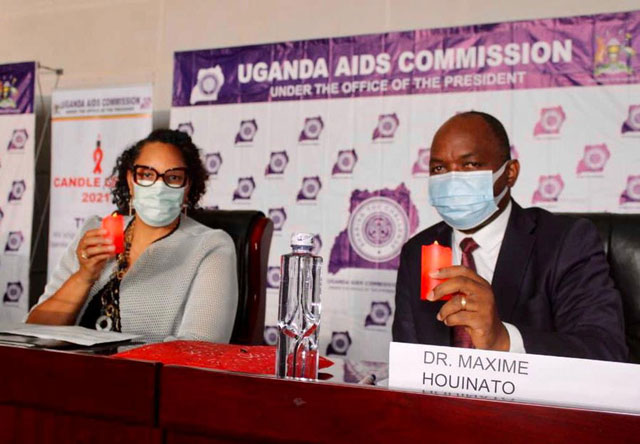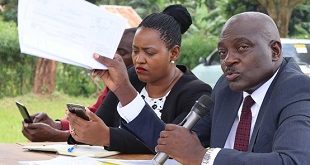
PEPFAR has invested more than $4 billion in Uganda alone, and more than $90 billion worldwide, over the past 18 years to save more than 19 million lives.
Kampala, Uganda | THE INDEPEDNENT | A record 18th U.S. President’s Emergency Plan for AIDS Relief (PEPFAR) Country Operation Plan for Uganda has been approved.
The plan articulates a continued commitment to increasing treatment literacy and messaging to expand knowledge, reducing stigma, and reaching every Ugandan who needs prevention, testing, and treatment to end HIV as a public health threat by 2030.
U.S. Ambassador Natalie E. Brown confirmed the approval at an address at the Uganda HIV/AIDS annual Candlelight Memorial Commemoration in Kampala on Thursday. The annual Candlelight Memorial event is one of the oldest and largest grassroots mobilization campaigns for HIV awareness in the world.
“Today, as we honor the memory of those who have lost their lives to AIDS, the United States re-commits itself to helping keep the light on HIV globally with the assurance that it will remain illuminated for all those who need it free of judgment, stigma, and discrimination,” Natalie E. Brown said.
The 🇺🇸 investments through @PEPFAR over the past 18yrs have saved 19+million lives🗺. That is 19 million people who have the opportunity to pursue their dreams & to achieve their full potential & 19M who continue to provide a source of light & hope to their families & loved ones. pic.twitter.com/F4N18yjDha
— U.S. Mission Uganda (@usmissionuganda) May 27, 2021
She said the President’s Emergency Plan for AIDS Relief (PEPFAR) has been and continues to be at the forefront of the AIDS battle in Uganda and globally.
“On this day, we remember the more than 2 million Ugandans, and the more than 35 million people worldwide, who have lost their lives to AIDS since the early 1980s. We are here today both to remember those who lost the fight and to re-commit ourselves to ‘Keeping the light on HIV’ until it is no longer a public health threat.”
PEPFAR has invested more than $4 billion in Uganda alone, and more than $90 billion worldwide, over the past 18 years to save more than 19 million lives. That’s 19 million children, women, and men who continue to provide a source of light and hope to their families and loved ones. 19 million people who have the opportunity to pursue their dreams and to achieve their full potential, thanks to our joint efforts.
****
FULL SPEECH
Honorable Minister of the Presidency, Hon. Esther Mbayo
- Honorable Members of Parliament present
- Director General, Uganda AIDS Commission – Dr. Nelson Musoba
- Managing Director, Uganda National Social Security Fund, Mr. Richard Patrick Byarugaba
- Ambassador of European Union to Uganda, Ambassador Attilio Pacifici
- Country Representative UN Women – Chair AIDS Development Partner Group, Dr. Maxime Houinato
- Development partners
- Heads of UN Agencies
- Religious and Cultural Leaders
- Civil Society Organizations and other key stakeholders
- Young people
- The many people with HIV/AIDS living full and fulfilling lives
Good afternoon to all. I am honored to be here today to represent the United States at this annual Candlelight Memorial event, one of the oldest and largest grassroots mobilization campaigns for HIV awareness in the world. On this day, we remember the more than 2 million Ugandans, and the more than 35 million people worldwide, who have lost their lives to AIDS since the early 1980s.
We are here today both to remember those who lost the fight and to re-commit ourselves to “Keeping the light on HIV” until it is no longer a public health threat.
I am proud that the U.S. President’s Emergency Plan for AIDS Relief (PEPFAR) has been and continues to be at the forefront of the AIDS battle here in Uganda and globally. PEPFAR has invested more than $4 billion in Uganda alone, and more than $90 billion worldwide, over the past 18 years to save more than 19 million lives. That’s 19 million children, women, and men who continue to provide a source of light and hope to their families and loved ones. 19 million people who have the opportunity to pursue their dreams and to achieve their full potential, thanks to our joint efforts.
Through the last 18 years, we have come a long way in the fight against HIV/AIDS, but we still have work to do.
This year’s theme for the Candlelight Memorial event here in Uganda is “Freeing workplaces of HIV/AIDS-based stigma and discrimination.” For those of us in an urban setting, this may be interpreted as companies and offices, but only a fraction of workplaces are in offices. This year in Uganda and worldwide, many who previously had formal workplaces are now working from home due to the COVID-19 pandemic, and many more worked in informal sectors every day prior to the pandemic and continue to do so.
Homes, communities, schools, places of worship, healthcare facilities, markets, and our streets are all someone’s workplace. So, what we are really focused on here today is freeing our homes, communities, countries, and the world of HIV/AIDS stigma and discrimination.
“For people w/HIV to live healthy, productive lives, they also need to be protected from #COVID19, especially as new strains spread & the positivity rate increases. If you are living with #HIV, I encourage you to get the💉. It’s free, it’s safe, it’s effective, & it saves lives.” pic.twitter.com/HWG5Vsdky4
— U.S. Mission Uganda (@usmissionuganda) May 27, 2021
Years ago, it was understandable that HIV-driven stigma and discrimination were widespread; the disease was not understood,
it was infecting people and causing death at a rapid rate, there was little hope for a cure or successful treatment and prevention strategies, and HIV was impacting millions of people around the world in every way imaginable.
That is no longer the case. Although we have not yet found a cure for HIV, we now better understand the disease, how to treat it, how to prevent it, and how to live long and healthy lives with it.
And yet, stigma and discrimination remain, causing unnecessary illness and death. The primary cause for stigma and discrimination remains a lack of knowledge and understanding. The 2019 People Living with HIV in Uganda Stigma Index Survey found that of those individuals who failed to enroll for treatment within six months after testing positive for HIV, 74% said they delayed doing so out of fear of others learning about their status. Additionally, the survey found that in the previous 12 months, more than 20% of survey respondents missed a dose of their ART due to fear of someone learning about their HIV positive status.
To free workplaces, homes, communities, the country, and the world of fear, we must make sure people know how they can prevent being affected by or infected with HIV. If they are unsure and afraid to know their status, we must help them understand the incredible life-changing impact of modern HIV treatment. And for those who have already been affected and infected, we must help those around them know that they can lead full and healthy lives. All of us have a role in promoting an inclusive and supportive environment.
Unfortunately, those at the highest risk of infection, including sex workers, intravenous drug users, and members of the LGBT community, have the fewest opportunities to seek treatment or are afraid to seek treatment or prevention services due to other drivers of stigma and discrimination. Policy actions that establish or increase criminal sanctions against these high-risk groups will only further decrease opportunities for prevention, testing, and treatment.
If we are to truly address the problem of stigma and discrimination, we must set aside our judgments of others and re-affirm the inherent dignity and fundamental rights of all humankind. Rather than casting those with different lifestyles in a shadow of judgment and stigma, preventing them from accessing the HIV prevention and treatment they deserve, we must extend our hand further to address the social and structural barriers that prevent them from accessing the support and treatment they need to live healthy productive lives.
And for people with HIV/AIDS to live healthy, productive lives, they also need to be protected from COVID-19, especially as new strains spread and the positivity rate increases. People who have weakened immune systems, which includes those living with HIV/AIDS, might be at increased risk for severe illness, especially if they have a low CD4 cell count or are not on effective treatment. If you are living with HIV/AIDS, I encourage you to get the jab. It’s free, it’s safe, it’s effective, and it saves lives. And for everyone else who’s eligible to be vaccinated, please do so. As secretary of State Blinken said, “no one is safe until we are all safe.”
Finally, I am pleased to inform you that just last week, the 18th PEPFAR Country Operation Plan for Uganda was approved. The plan articulates a continued commitment to increasing treatment literacy and messaging to expand knowledge, reducing stigma, and reaching every Ugandan who needs prevention, testing, and treatment to end HIV as a public health threat by 2030.
So today, as we honor the memory of those who have lost their lives to AIDS, the United States re-commits itself to helping keep the light on HIV globally with the assurance that it will remain illuminated for all those who need it free of judgment, stigma, and discrimination.
Thank you.
 The Independent Uganda: You get the Truth we Pay the Price
The Independent Uganda: You get the Truth we Pay the Price


